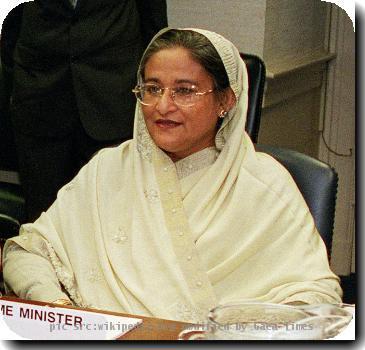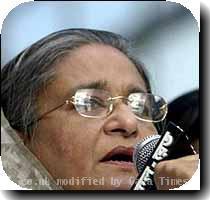Dozens arrested during opposition-called general strike in Bangladesh
By Julhas Alam, APSunday, June 27, 2010
Dozens arrested in Bangladesh opposition strike
DHAKA, Bangladesh — Security forces arrested dozens of activists Sunday as Bangladesh’s main opposition party led a nationwide dawn-to-dusk general strike to protest alleged government misrule.
General strikes have been a common opposition tactic in Bangladesh, a fragile parliamentary democracy since nine years of military rule ended in 1990. But Sunday’s strike was the first in 3 1/2 years, signaling that political bickering may return to the streets.
Several people were injured in clashes between opposition supporters and the ruling Awami League’s student wing near a university in Dhaka, private ATN Bangla television reported.
About 10,000 security forces were deployed in the capital and schools and businesses were closed, witnesses said. Only a few tricycle rickshaws plied the city’s usually clogged streets.
Authorities erected barbed-wire fences in parts of Dhaka, and police Commissioner A.K.M. Shahidul Haque said police would not allow any rallies to block major streets.
Walid Hossain, a Dhaka Metropolitan Police official, said at least 61 people were arrested in the capital. ATN Bangla said arrests also occurred in several other districts.
Those arrested included a former Cabinet minister and three senior aides of opposition leader Khaleda Zia, the Daily Star newspaper reported.
The Bangladesh Nationalist Party, led by Zia, a former prime minister, called the strike to protest alleged Awami League misrule. Zia accused the government of suppressing the opposition and failing to control commodity prices or improve law and order.
The strike also protested recent deals with India made by the administration of Prime Minister Sheikh Hasina, Zia said. The opposition maintains that those agreements — including use of Bangladesh ports by India and Bangladesh’s import of Indian power — are against national interests.
In Chittagong, Bangladesh’s second-largest city, the strike disrupted the transport of goods from the country’s main port, said Osman Gani Mansoor, a local journalist.
An interim government took power in early 2007 and imposed a state of emergency after weeks of violence between the political camps led by Zia and Hasina. It then arrested both leaders, but later released them ahead of elections which Hasina’s alliance won overwhelmingly.
Frustration has been growing among citizens over frequent power cuts and deteriorating law and order, among other issues. Zia’s opposition coalition has boycotted parliament, saying the ruling alliance has prevented it from bringing up the people’s problems.
Some citizens were critical of Sunday’s political strife.
“This is unexpected. We don’t want this conflict again,” Abdur Razzak, a retired banker, said in Dhaka’s Uttara residential district.
“It’s better if they discuss issues in parliament instead of clashing on the streets,” he said.

